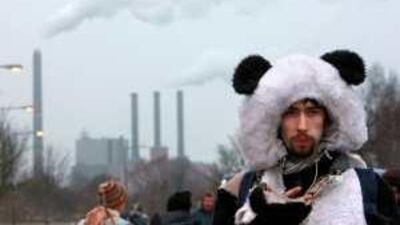Two years ago, the head of the UN's climate science panel told an audience in Abu Dhabi that the debate was settled: the planet was warming, emissions of greenhouse gases from human activity were the main cause, and rapid action had to be taken to avert potential catastrophe.
Dr Rajendra Pachauri, the chairman of the Intergovernmental Panel on Climate Change (IPCC), received no challenges to his message from the audience at Emirates Centre for Strategic Studies and Research in 2008, but today he is struggling harder than ever against a renewed chorus of doubt in the West about the science of climate change. In the past four months, global warming sceptics have delivered a series of embarrassing blows to the conclusions of climate science. The IPCC has admitted that the group's landmark, peer-reviewed report of 2007 contained several errors, including the assertion that Himalayan glaciers could melt by 2035. In late November, a series of hacked e-mails from leading climate researchers were published, and appeared to show discussion of how to manipulate data to bolster the science behind climate change.
Each setback has been amplified by an echo chamber of climate sceptics, such as the editorial board of The Wall Street Journal. "The IPCC has been advertised as the last and definitive word on climate science," the newspaper wrote this month. "Now we are discovering the UN reports are sloppy political documents intended to drive the climate lobby's regulatory agenda." The errors have done little to disrupt the consensus among scientists that carbon emissions are warming the planet, experts say, but they have made an impression on the public.
In the UK, a poll conducted by Ipsos Mori this month showed that only 31 per cent of people saw climate change as "definitely" a reality, down from 44 per cent a year earlier. In the US, a poll conducted by Yale and George Mason universities from late December to early January found that 57 per cent of Americans answered "yes" to the question of whether they thought global warming was happening, down from 71 per cent the year before.
The risk for proponents of a treaty is that doubts about the science could undermine domestic support for efforts to curtail emissions, especially in the US, the world's second-largest emitter of carbon dioxide. This growth in popular scepticism diverges from a trend of increasing support on an international level for efforts to confront climate change. High-level climate talks in Denmark in December involving more than 100 heads of government failed to yield a binding global treaty to reduce emissions but did result in the Copenhagen Accord, a statement that global warming was real and should be limited to 2°C. In the past two months, more than 100 countries, including the UAE, have associated themselves with the statement.
"The politics have moved very strongly in a good direction," said Lord Stern, the author of a benchmark 2006 report on climate change. "You wouldn't have got 100-plus heads of government showing up for something like this four years ago." Negotiators will meet again in Germany in June to settle technical questions, and in Mexico in December to take another crack at a full-scale climate treaty. But the ultimate success of that effort is tied in part to US domestic politics, analysts agree, because no effort to cut emissions will work without the participation of the world's largest economy.
Barack Obama, the US president, has pledged to reduce the country's emissions by 17 per cent by 2020 from 2005 levels, but his ability to deliver on that pledge is now in doubt. The Democratic Party's loss of the Senate seat held by the late Edward Kennedy has made the passage of climate legislation much more difficult. And Mr Obama's claim to have the power to mandate carbon emissions cuts directly through the environmental bureaucracy has been challenged in court.
Conservative politicians have capitalised on their momentum, arguing against drastic action to reduce the use of fossil fuels and suggesting that the IPCC be reformed or even abolished and new studies on global warming conducted before the US agrees to reduce emissions. The problem, proponents of a climate treaty say, is that time has already expired. On a visit to Abu Dhabi last week, Steven Chu, the US energy secretary, spent 40 minutes laying out the case for climate science to an audience of students and government officials at Emirates Palace. Temperatures were on track to rise by up to 6°C by the end of the century, he warned.
He presented graphs to show that the concentration of carbon dioxide in the atmosphere was higher than in the past 800,000 years, and charts showing that average global temperatures rose in the past century. He also attacked alternative explanations for warming offered by sceptics, such as a cyclical increase in heat from the sun. Satellite measurements, he said, show that the thickness of the Greenland ice sheet has receded since 2002 even as snow storms increased, and the ice, together with the land-based ice in Antarctica, could melt over several hundred years.
Antarctica, he said, was ice-free millions of years ago, when average global temperatures were 8°C higher. "The Earth evolved over time, but it evolved over millions of years," he said, emphasising the contrast with today's projection for rapid temperature increases over 100 years. The science was robust enough to define the risk level with a reasonable degree of confidence, said Steve Howard, the chief executive of the Climate Group, a prominent lobbying organisation that has worked with governments and Tony Blair, the former British prime minister.
"Even if we accept there is a chance that the science is somehow wrong, the consequences of inaction in the case that it is right mean we would be irresponsible not to act," he said. "We insure our houses against fire even though the risk of fire is low; on climate we have piled up the kindling around our house and it is starting to smoke." cstanton@thenational.ae

